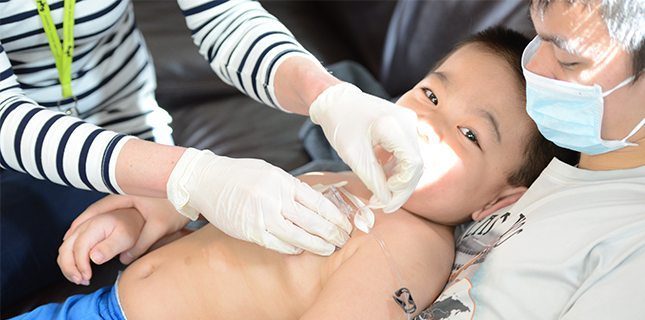What Do My Infusion Nurse’s Credentials Mean?

When your child receives infusion therapy from PHS, you never need to worry about a nurse coming into your home under trained – our staff are thoroughly educated on every aspect of a patient’s care prior to providing administrations solo, spending time in both the classroom setting and with mentors as they shadow and are shadowed at patient visits.
But as the letters after their names show, our nurses have more than on-the-job training – they’ve gone through years of education before coming to PHS, and often continue on with advanced certifications and specializations in an effort to provide the very best in pediatric infusion care. So just what do all the letters after your nurse’s name mean? We walked through the nursing credentials that members of our infusion team have so you can have a better understanding next time you feel like you’re looking at alphabet soup!

To be licensed to provide care, every infusion nurse must be an RN – but there are two educational routes they may have taken.
Students can earn an Associate Degree in Nursing (ADN) by completing a two-year nursing program through a college or university. Their credentials will list ‘RN’.
Nurses may also have their BSN, which is a bachelor’s degree in nursing – a credential that comes from completing this education at a four-year college. Their credentials will often list as ‘RN, BSN’.
Regardless of which route PHS nurses have taken to become an RN, all nurses must take a national exam and come to us with the background and passion to help kiddos thrive at home. From there, we provide even more training to infusion nurses specific to these therapies, lines, and pediatric specialties.

CRNI stands for certified registered nurse of infusion– meaning they’ve done extensive studying and preparation for an exam that tests their knowledge of everything infusion. Nurses with this credential are extremely specialized, and have been more trained in special circumstances surrounding infusion therapy from medications and what they do to a person’s body, to the equipment used in infusion or what therapies work best with which types of line.
While PHS trains all of its infusion nurses on these topics, those with a CRNI certification have taken an additional step in becoming experts on them. PHS currently has five nurses certified in infusion, with two more expected to become certified this spring.

CPN stands for certified pediatric nurse. Staff with this credential have studied and passed a 175 question exam showing their knowledge of pediatric-specific care from child assessment to monitoring and intervention performance. They must have at least 1800 practice hours in the last 24 months, and may have an associate’s degree, bachelor’s degree, or more.

There are a number of organizations to be certified through, and this is another credentialing program nurses can receive specialized education from. PHS has a nurse who is board certified in pediatrics through the ANCC (American Nurses Credentialing Center). They’ve gone on to become experts in their field – in this case, pediatrics!
Supporting continued education
With any credential, nurses must maintain their license by obtaining a certain amount of continued education credits – meaning our nurses are continually advancing their education and learning more as it’s relevant to their field. And because PHS knows the value of a well-educated caregiver, all continued education is covered by the company.
Are there any other nursing credentials you’ve seen that you couldn’t identify? With so many out there, we barely scraped the nursing surface of specialization options by introducing those within our infusion department. Hopefully this helps you understand your nurse’s background a bit better!
Originally published: February 17, 2017

